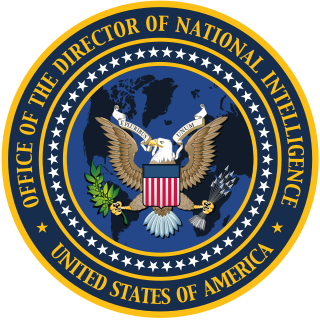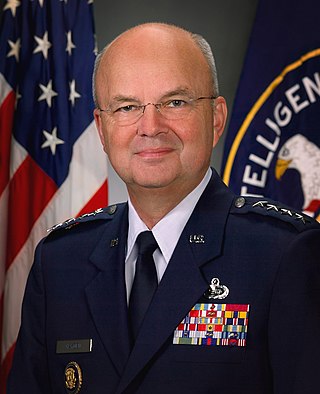
The National Security Agency (NSA) is an intelligence agency of the United States Department of Defense, under the authority of the Director of National Intelligence (DNI). The NSA is responsible for global monitoring, collection, and processing of information and data for foreign and domestic intelligence and counterintelligence purposes, specializing in a discipline known as signals intelligence (SIGINT). The NSA is also tasked with the protection of U.S. communications networks and information systems. The NSA relies on a variety of measures to accomplish its mission, the majority of which are clandestine. The NSA has roughly 32,000 employees.

The director of national intelligence (DNI) is a senior, cabinet-level United States government official, required by the Intelligence Reform and Terrorism Prevention Act of 2004 to serve as executive head of the United States Intelligence Community (IC) and to direct and oversee the National Intelligence Program (NIP). All IC agencies report directly to the DNI. The DNI also serves, upon invitation, as an advisor to the president of the United States, the National Security Council and the Homeland Security Council on all intelligence matters. The DNI, supported by the Office of the Director of National Intelligence (ODNI), produces the President's Daily Brief (PDB), a classified document including intelligence from all IC agencies, handed each morning to the president of the United States.

The United States Intelligence Community (IC) is a group of separate United States government intelligence agencies and subordinate organizations that work both separately and collectively to conduct intelligence activities which support the foreign policy and national security interests of the United States. Member organizations of the IC include intelligence agencies, military intelligence, and civilian intelligence and analysis offices within federal executive departments.

The Foreign Intelligence Surveillance Act of 1978 is a United States federal law that establishes procedures for the surveillance and collection of foreign intelligence on domestic soil.

The National Intelligence Distinguished Service Medal (NIDSM) is a decoration awarded for service to the United States Intelligence Community. The decoration is awarded to any member or contributor to the National Intelligence Community, either civilian or military, who distinguishes themselves by meritorious actions to the betterment of national security in the United States of America, through sustained and selfless service of the highest order.
Booz Allen Hamilton Holding Corporation is the parent of Booz Allen Hamilton Inc., an American government and military contractor, specializing in intelligence. It is headquartered in McLean, Virginia, in Greater Washington, D.C., with 80 other offices around the globe. The company's stated core business is to provide consulting, analysis and engineering services to public and private sector organizations and nonprofits.
The National Intelligence Board (NIB), formerly the National Foreign Intelligence Board and before that the United States Intelligence Board is a body of senior U.S. Intelligence Community leaders currently led by the Director of National Intelligence (DNI). The Board is tasked with reviewing and approving National Intelligence Estimates (NIEs).

NSA warrantless surveillance — also commonly referred to as "warrantless-wiretapping" or "-wiretaps" — was the surveillance of persons within the United States, including U.S. citizens, during the collection of notionally foreign intelligence by the National Security Agency (NSA) as part of the Terrorist Surveillance Program. In late 2001, the NSA was authorized to monitor, without obtaining a FISA warrant, phone calls, Internet activities, text messages and other forms of communication involving any party believed by the NSA to be outside the U.S., even if the other end of the communication lays within the U.S.
The Gang of Eight is a colloquial term for a set of eight leaders within the United States Congress who are briefed on classified intelligence matters by the executive branch. Specifically, the Gang of Eight includes the leaders of each of the two parties from both the Senate and House of Representatives, and the chairs and ranking minority members of both the Senate Committee and House Committee for intelligence as set forth by 50 U.S.C. § 3093(c)(2).
The Privacy and Civil Liberties Oversight Board (PCLOB) is an independent agency within the executive branch of the United States government, established by Congress in 2004 to advise the President and other senior executive branch officials to ensure that concerns with respect to privacy and civil liberties in the United States are appropriately considered in the development and implementation of all laws, regulations, and executive branch policies related to terrorism.

Michael Vincent Hayden is a retired United States Air Force four-star general and former Director of the National Security Agency, Principal Deputy Director of National Intelligence, and Director of the Central Intelligence Agency. He also serves as a professor at the George Mason University – Schar School of Policy and Government. Hayden currently co-chairs the Bipartisan Policy Center's Electric Grid Cyber Security Initiative. In 2017, Hayden became a national security analyst for CNN.

The under secretary of defense for intelligence and security or USD(I&S) is a high-ranking civilian position in the Office of the Secretary of Defense (OSD) within the U.S. Department of Defense (DoD) that acts as the principal civilian advisor and deputy to the secretary of defense (SecDef) and deputy secretary of defense (DepSecDef) on matters relating to military intelligence and security. The under secretary is appointed as a civilian by the president and confirmed by the Senate to serve at the pleasure of the president.

James Robert Clapper Jr. is a retired lieutenant general in the United States Air Force and former Director of National Intelligence. Clapper has held several key positions within the United States Intelligence Community. He served as director of the Defense Intelligence Agency (DIA) from 1992 until 1995. He was the first director of defense intelligence within the Office of the Director of National Intelligence and simultaneously the Under Secretary of Defense for Intelligence. He served as the director of the National Geospatial-Intelligence Agency (NGA) from September 2001 until June 2006.

The Protect America Act of 2007 (PAA),, is a controversial amendment to the Foreign Intelligence Surveillance Act (FISA) that was signed into law by U.S. President George W. Bush on August 5, 2007. It removed the warrant requirement for government surveillance of foreign intelligence targets "reasonably believed" to be outside the United States. The FISA Amendments Act of 2008 reauthorized many provisions of the Protect America Act in Title VII of FISA.

The President's Surveillance Program (PSP) is a collection of secret intelligence activities authorized by the President of the United States George W. Bush after the September 11 attacks in 2001 as part of the War on Terrorism. Information collected under this program was protected within a Sensitive Compartmented Information security compartment codenamed STELLARWIND.

In the United States the Associate Director of National Intelligence and Chief Information Officer is charged with directing and managing activities relating to information technology for the Intelligence Community (IC) and the Office of the Director of National Intelligence (ODNI). The IC CIO reports directly to the Director of National Intelligence (DNI). As of January 24, 2022, Dr. Adele Merritt has assumed duties as the IC Chief Information Officer.

John Frederick "Jeff" Kimmons is a retired American lieutenant general, who served as United States Army Assistant Chief of Staff for Intelligence, Commanding General, United States Army Intelligence and Security Command and chief of staff to the Director of National Intelligence. He was instrumental in the development of Army Field Manual, FM 2-22.3, Human Intelligence Collector Operations, which was the Army's response to actions at Abu Ghraib prison. Kimmons retired from active service on December 1, 2010, after 35 years.

PRISM is a code name for a program under which the United States National Security Agency (NSA) collects internet communications from various U.S. internet companies. The program is also known by the SIGAD US-984XN. PRISM collects stored internet communications based on demands made to internet companies such as Google LLC and Apple under Section 702 of the FISA Amendments Act of 2008 to turn over any data that match court-approved search terms. Among other things, the NSA can use these PRISM requests to target communications that were encrypted when they traveled across the internet backbone, to focus on stored data that telecommunication filtering systems discarded earlier, and to get data that is easier to handle.

Boundless Informant is a big data analysis and data visualization tool used by the United States National Security Agency (NSA). It gives NSA managers summaries of the NSA's worldwide data collection activities by counting metadata. The existence of this tool was disclosed by documents leaked by Edward Snowden, who worked at the NSA for the defense contractor Booz Allen Hamilton. Those disclosed documents were in a direct contradiction to the NSA's assurance to United States Congress that it does not collect any type of data on millions of Americans.

Former U.S. President Barack Obama favored some levels of mass surveillance. He has received some widespread criticism from detractors as a result. Due to his support of certain government surveillance, some critics have said his support may have gone beyond acceptable privacy rights. This is of course a debatable conclusion. Many former US presidents have increased the abilities and techniques used for intelligence gathering. President Obama released many statements on mass surveillance.

















